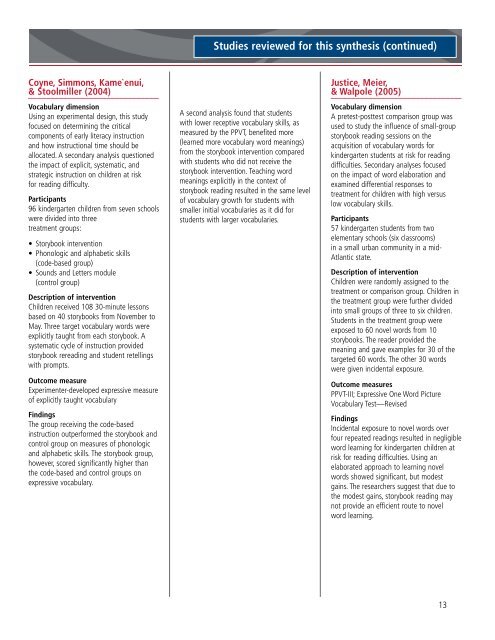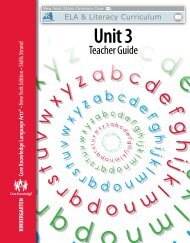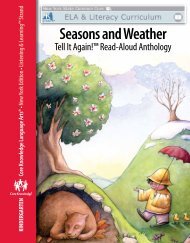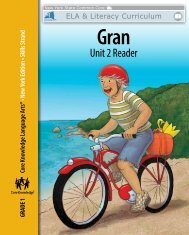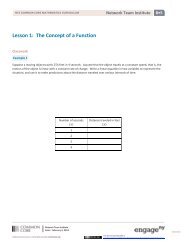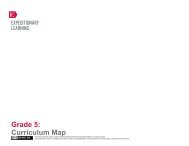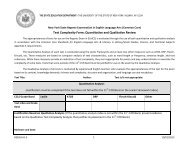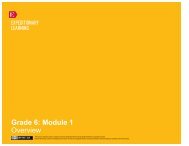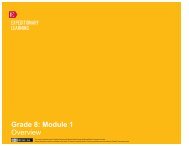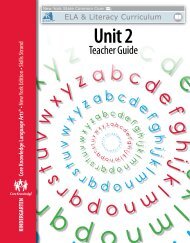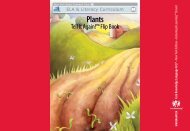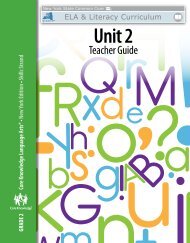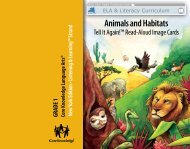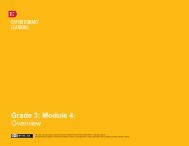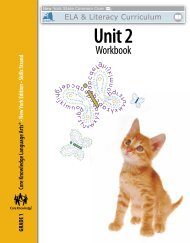A Review of the Current Research on Vocabulary Instruction - U.S. ...
A Review of the Current Research on Vocabulary Instruction - U.S. ...
A Review of the Current Research on Vocabulary Instruction - U.S. ...
You also want an ePaper? Increase the reach of your titles
YUMPU automatically turns print PDFs into web optimized ePapers that Google loves.
Studies reviewed for this syn<str<strong>on</strong>g>the</str<strong>on</strong>g>sis (c<strong>on</strong>tinued) Appendix<br />
Coyne, Simm<strong>on</strong>s, Kame`enui,<br />
& Stoolmiller (2004)<br />
<strong>Vocabulary</strong> dimensi<strong>on</strong><br />
Using an experimental design, this study<br />
focused <strong>on</strong> determining <str<strong>on</strong>g>the</str<strong>on</strong>g> critical<br />
comp<strong>on</strong>ents <str<strong>on</strong>g>of</str<strong>on</strong>g> early literacy instructi<strong>on</strong><br />
and how instructi<strong>on</strong>al time should be<br />
allocated. A sec<strong>on</strong>dary analysis questi<strong>on</strong>ed<br />
<str<strong>on</strong>g>the</str<strong>on</strong>g> impact <str<strong>on</strong>g>of</str<strong>on</strong>g> explicit, systematic, and<br />
strategic instructi<strong>on</strong> <strong>on</strong> children at risk<br />
for reading difficulty.<br />
Participants<br />
96 kindergarten children from seven schools<br />
were divided into three<br />
treatment groups:<br />
• Storybook interventi<strong>on</strong><br />
• Ph<strong>on</strong>ologic and alphabetic skills<br />
(code-based group)<br />
• Sounds and Letters module<br />
(c<strong>on</strong>trol group)<br />
Descripti<strong>on</strong> <str<strong>on</strong>g>of</str<strong>on</strong>g> interventi<strong>on</strong><br />
Children received 108 30-minute less<strong>on</strong>s<br />
based <strong>on</strong> 40 storybooks from November to<br />
May. Three target vocabulary words were<br />
explicitly taught from each storybook. A<br />
systematic cycle <str<strong>on</strong>g>of</str<strong>on</strong>g> instructi<strong>on</strong> provided<br />
storybook rereading and student retellings<br />
with prompts.<br />
Outcome measure<br />
Experimenter-developed expressive measure<br />
<str<strong>on</strong>g>of</str<strong>on</strong>g> explicitly taught vocabulary<br />
Findings<br />
The group receiving <str<strong>on</strong>g>the</str<strong>on</strong>g> code-based<br />
instructi<strong>on</strong> outperformed <str<strong>on</strong>g>the</str<strong>on</strong>g> storybook and<br />
c<strong>on</strong>trol group <strong>on</strong> measures <str<strong>on</strong>g>of</str<strong>on</strong>g> ph<strong>on</strong>ologic<br />
and alphabetic skills. The storybook group,<br />
however, scored significantly higher than<br />
<str<strong>on</strong>g>the</str<strong>on</strong>g> code-based and c<strong>on</strong>trol groups <strong>on</strong><br />
expressive vocabulary.<br />
A sec<strong>on</strong>d analysis found that students<br />
with lower receptive vocabulary skills, as<br />
measured by <str<strong>on</strong>g>the</str<strong>on</strong>g> PPVT, benefited more<br />
(learned more vocabulary word meanings)<br />
from <str<strong>on</strong>g>the</str<strong>on</strong>g> storybook interventi<strong>on</strong> compared<br />
with students who did not receive <str<strong>on</strong>g>the</str<strong>on</strong>g><br />
storybook interventi<strong>on</strong>. Teaching word<br />
meanings explicitly in <str<strong>on</strong>g>the</str<strong>on</strong>g> c<strong>on</strong>text <str<strong>on</strong>g>of</str<strong>on</strong>g><br />
storybook reading resulted in <str<strong>on</strong>g>the</str<strong>on</strong>g> same level<br />
<str<strong>on</strong>g>of</str<strong>on</strong>g> vocabulary growth for students with<br />
smaller initial vocabularies as it did for<br />
students with larger vocabularies.<br />
Justice, Meier,<br />
& Walpole (2005)<br />
<strong>Vocabulary</strong> dimensi<strong>on</strong><br />
A pretest-posttest comparis<strong>on</strong> group was<br />
used to study <str<strong>on</strong>g>the</str<strong>on</strong>g> influence <str<strong>on</strong>g>of</str<strong>on</strong>g> small-group<br />
storybook reading sessi<strong>on</strong>s <strong>on</strong> <str<strong>on</strong>g>the</str<strong>on</strong>g><br />
acquisiti<strong>on</strong> <str<strong>on</strong>g>of</str<strong>on</strong>g> vocabulary words for<br />
kindergarten students at risk for reading<br />
difficulties. Sec<strong>on</strong>dary analyses focused<br />
<strong>on</strong> <str<strong>on</strong>g>the</str<strong>on</strong>g> impact <str<strong>on</strong>g>of</str<strong>on</strong>g> word elaborati<strong>on</strong> and<br />
examined differential resp<strong>on</strong>ses to<br />
treatment for children with high versus<br />
low vocabulary skills.<br />
Participants<br />
57 kindergarten students from two<br />
elementary schools (six classrooms)<br />
in a small urban community in a mid-<br />
Atlantic state.<br />
Descripti<strong>on</strong> <str<strong>on</strong>g>of</str<strong>on</strong>g> interventi<strong>on</strong><br />
Children were randomly assigned to <str<strong>on</strong>g>the</str<strong>on</strong>g><br />
treatment or comparis<strong>on</strong> group. Children in<br />
<str<strong>on</strong>g>the</str<strong>on</strong>g> treatment group were fur<str<strong>on</strong>g>the</str<strong>on</strong>g>r divided<br />
into small groups <str<strong>on</strong>g>of</str<strong>on</strong>g> three to six children.<br />
Students in <str<strong>on</strong>g>the</str<strong>on</strong>g> treatment group were<br />
exposed to 60 novel words from 10<br />
storybooks. The reader provided <str<strong>on</strong>g>the</str<strong>on</strong>g><br />
meaning and gave examples for 30 <str<strong>on</strong>g>of</str<strong>on</strong>g> <str<strong>on</strong>g>the</str<strong>on</strong>g><br />
targeted 60 words. The o<str<strong>on</strong>g>the</str<strong>on</strong>g>r 30 words<br />
were given incidental exposure.<br />
Outcome measures<br />
PPVT-III; Expressive One Word Picture<br />
<strong>Vocabulary</strong> Test—Revised<br />
Findings<br />
Incidental exposure to novel words over<br />
four repeated readings resulted in negligible<br />
word learning for kindergarten children at<br />
risk for reading difficulties. Using an<br />
elaborated approach to learning novel<br />
words showed significant, but modest<br />
gains. The researchers suggest that due to<br />
<str<strong>on</strong>g>the</str<strong>on</strong>g> modest gains, storybook reading may<br />
not provide an efficient route to novel<br />
word learning.<br />
13


